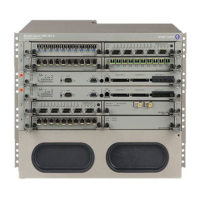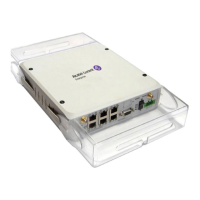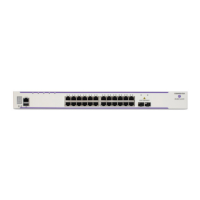Forwarding Plane Commands
Page 464 7750 SR OS Interface Configuration Guide
slope-policy
Syntax slope-policy slope-policy-name
no slope-policy
Context config>card>fp>egress>max-wred-control
Description This command command configures WRED slopes within the WRED mega-pool. The WRED slopes
in the WRED mega-pool are used when WRED queues are requesting buffers from the mega-pool
while they are over their CBS threshold. Once over the CBS threshold, the WRED queue stops
receiving buffers from the CBS reserve in the mega-pool and starts competing for buffers in the
shared portion of the mega-pool. If the packet resulting in the buffer request is in-profile, the packet
will be associated with the high priority slope. Out-of-profile packets are associated with the low
priority slope. While the queue is within its CBS threshold, the slopes are ignored.
Within the defined slope-policy, each slope is enabled or disabled (no shutdown or shutdown) and
each slope’s geometry is defined as percentages of shared portion depth.
The slope-policy also defines the time average factor (taf) value that is used to determine how the
pool’s weighted average depth is calculated. The higher the factor, the slower the average depth
tracks the actual pool depth.
The no form of the command restores the default slope policy to the WRED mega-pool.
Parameters slope-policy-name — This required parameter specifies which slope policy the system should apply
to the WRED mega-pool. When slope-policy is not executed, the WRED mega-pool will use the
default slope policy. The defined slope policy must already exist or the command will fail.
Default When not defined, the default slope policy is used
hi-bw-mcast-src
Syntax hi-bw-mcast-src [alarm] [group group-id]
no hi-bw-mcast-src
Context config>card>fp
Description This command designates the forwarding plane as a high-bandwidth IP multicast source, expecting
the ingress traffic to include high-bandwidth IP multicast traffic. When configured, the system
attempts to allocate a dedicated multicast switch fabric plane (MSFP) to the forwarding plane. If a
group is specified, all MDAs in the group will share the same MSFP. If the alarm parameter is
specified and the system cannot allocate a dedicated MSFP to the new group or MDA, the MDAs
will be brought online and generate an event (SYSTEM: 2052 - mdaHiBwMulticastAlarm).
Similarly, if during normal operation there is a failure or removal of resources, an event will be
generated if the system cannot maintain separation of MSFPs for the MDAs.
This feature is supported on the 7750 SR-7 and 7750 SR-12.
The no form of the command removes the high-bandwidth IP multicast source designation from the
forwarding plane.
Default no hi-bw-mcast-src

